- Home
- Terry Brooks
Wards of Faerie: The Dark Legacy of Shannara Page 3
Wards of Faerie: The Dark Legacy of Shannara Read online
Page 3
Aphenglow reached out and touched her sister’s face. “The tree is magic, Arling. It doesn’t seem too odd that magical things might happen in its presence. Even ones of the sort you describe. Is the tree all right?”
Arlingfant nodded. “She seems fine. No one mentioned anything at the end of the day. It was just these … things.”
Aphenglow stood up. “Do you want a glass of milk?”
Her sister nodded, and Aphenglow walked into the kitchen, opened the cold box, took out the milk pitcher, and poured a little of its contents into two glasses. She put the milk away again and carried the glasses back into the living room.
“It will help you sleep,” she said, handing Arlingfant the glass.
They drank the milk in silence, sitting in the darkness, the quarter moon’s soft light spilling down through the trees and filtering in through the cottage windows. Her mind drifted back to the diary, and for a moment she toyed with the idea of telling her sister what she had found. It would be good to have another opinion, to share her thoughts with someone who might bring a fresh perspective. But she resisted the impulse. She didn’t want to put her sister in the position of having to cover for her if someone found out. Shared thoughts and fresh opinions could wait until she knew something more.
“Find anything interesting today?” Arlingfant asked suddenly, as if reading her mind.
“Nothing,” Aphen lied. Lying was getting easier. It was starting to feel natural. “I’m getting to the end of my search, though. Not too many more boxes of letters and notes to go. I finished the last of the history appendices a week ago. It’s exhausting work.”
“Translating must be hard. So much of it is archaic. Ancient Elfish. Different dialects. It’s good that you’re trained to read those.”
Aphenglow nodded. She had studied ancient Elven languages starting at the age of ten. She had a knack for it, a real sense of meanings and purposes in the use of words, and when she’d returned a year ago to undertake this task, she had come prepared with more than fifteen years of experience in deciphering what Elves thousands of years gone had written down.
“I might have to return to Paranor for a bit,” she said suddenly. “For a week or so, perhaps.”
The idea had just occurred to her, although in truth she must have known from the moment she had read the first few entries in the diary. She needed to consult the other Druids. A decision had to be made about what to do with this information, and where to take the search from here. She had promised her grandfather she would not take anything away, but the promise had been falsely given. She had always intended to take whatever she found. She was an Elf and loyal to her people, but not at the expense of the other Races. In that regard, she was a Druid first. Magic was meant to be shared, and it was safest in the hands of the Druids, who would make sure that happened.
“Aphen.” Her sister moved close to her, placing her hands on Aphen’s shoulders. “Take me away. I want to leave here. I want to go with you.”
Aphenglow shook her head. “You know I can’t do that.”
“I know you’ve said you can’t. But there’s nothing you can’t do, if you want to. A Druid has immense power, and you are the best of them all. If you tell them you want me there, they will have to let me stay.”
They had covered this before, many times. Arlingfant had it in her head that she was meant to be not a Chosen, but a Druid like her sister. She didn’t care about the inevitable repercussions. She was prepared to give up everything if Aphen would just take her to Paranor.
“You can’t leave your friends to tend the Ellcrys without you,” Aphenglow said pointedly. “They need you. If I am the best of the Druids, you are ten times the best of the Chosen. You are the one who always knows what to do. How many times have you ferreted out sickness or blight that no one else even noticed? You can’t walk away from that. Later, maybe, when your year of service is finished. But not now.”
“I know, I know. You’ve said this often enough. But I want to study magic with you!”
“Which leads to something else you keep ignoring. I don’t make the choice of who becomes a Druid by myself. All in service must agree, and the Ard Rhys must be awake when that happens. At present, she rests in the Druid Sleep and is not to be woken for another two years unless an emergency requires it. Taking in another Druid—even you, Arling—does not qualify as an emergency.”
“Besides,” she added, “there is a reluctance to accept members of the same family into the order. You know this. There are genuine concerns about how blood ties would affect their performance as Druids.”
She embraced her sister. “Nevertheless, when your service is over I will put your name before the others and make every effort to gain you a place. Don’t you think I would like to have you with me? Don’t you know I miss you?”
Arlingfant hugged her back. “I do know, Aphen. I don’t mean to be unreasonable. But it’s hard sometimes to have to wait so long.”
Aphen laughed. “I know what you mean. Go on to bed, now. I will be up shortly. I just need to go through my notes one more time to be sure I’ve written everything down.”
Her sister kissed her on the cheek, got to her feet, and left the room. Aphenglow listened to the soft pad of her feet on the stairs, the squeak of the bed ropes, and silence.
Then she took out the diary and sat looking at the last entry. Pathke, Meresch, and their Aleia. Very likely a King, his wife, and his daughter. She must find their place in the Elven histories and determine if that might in some way help with her search for the missing Elfstones. Certainly it had happened a long time ago; the Elfstones had been missing since the last war between the Word and Void, in the time of Faerie.
And the city of Rajancroft where the Darkling boy had lived—where was that?
She must find all this out and begin fitting the pieces together. She must ferret out—
A shadow passed by the window on her right, and the thought was left unfinished as her attention shifted immediately. She did not react to the movement—she was trained to do otherwise—but instead closed the diary and slipped it down between the cushions on her left, effectively hiding it from view in a smooth natural movement that wouldn’t be noticed by watching eyes.
She waited a moment, giving herself time to think and her watcher time to reappear at the window.
When nothing happened, she stood up, looking as if she might be ready to retire, but using the act as a way to glance from window to window.
Nothing.
And then a silken cord, its threads strong and tightly wound, slipped about her neck and cut off her air.
Her attacker’s moves were so practiced and smooth that she was certain he had killed this way before. It would have meant the death of many others, and she had only a moment to ensure it would not be hers. She slammed her head backward into his, stomped down on his right ankle, and thrust her elbow back into his rib cage. She had been trained in hand-to-hand combat by no less an authority than the formidable Bombax, and she knew exactly what to do.
The problem was that it seemed to make no difference to her attacker, who barely responded to what would have crippled others.
Pressed close against him as he continued to twist and tighten the cord, she tried to throw him and failed. He was too heavy, too well balanced. Even as tall and strong as she was, she was no match for him. She tried to use his weight against him, to trip him and topple him to the floor. That, too, failed. They were careening about the room like wild things, slamming into the walls, furnishings flying about, tipping over, breaking. Aphenglow possessed defensive skills that made her the equal of anyone, but she was losing this fight. She could feel her strength seeping away and could see spots before her eyes.
Then Arlingfant came tearing down the stairs, screaming like a banshee, a cudgel gripped in both hands. Without slowing, she whacked at her sister’s attacker, catching him on the side of the head with a blow that rocked him just enough for Aphenglow to tear herself free of the kill
ing cord.
But when she turned to engage her attacker, he was already out the door and had vanished into the night. Arling started to give pursuit, but Aphenglow pulled her back, shaking her head.
It took her a moment before she could speak. “Let him go,” she said, gasping for breath. “We don’t want to give him the advantage he seeks by bungling out into the darkness.”
Her attacker was male. Of that she was certain—of his sex if not his Race. She had seen his wrists when he broke away—just a glimpse, but enough to be able to tell by the size and the amount of hair.
She moved over to a bench next to the dining table and lowered herself gingerly. The cord had burned her neck, and her breathing was still ragged. “You saved me, Arling. He was too strong for me. I couldn’t fight him off.”
Her sister bent close, examining her neck. “I hope I bashed his head in,” she muttered. “Sit still. I’ll bring cold cloths and ointment for the burn.”
She moved into the kitchen, and Aphenglow quickly stepped over to the chair, retrieved the diary, and slipped it into her blouse. She was furious with herself for allowing someone to get that close. It shouldn’t have been possible for an attacker to creep up on her like that; her normally dependable instincts should have warned her. That they hadn’t was troubling.
Arlingfant was back, carrying a small, lighted lantern, which she placed on the table next to her sister. Then she proceeded to clean the burns with cold cloths and to apply a pain-relieving ointment. She worked quickly and efficiently, her small fingers smooth and clever.
“Who would do this?” she asked, the anger in her voice undiminished. “Why would anyone attack you in your own home?”
“I don’t know,” Aphenglow lied, already suspecting why, if not who.
“Did they take anything?”
“No. What is there to take? It was probably just someone who doesn’t care for young women leaving their Elven family to join a Druid order. Perhaps someone with a grudge or a perceived hurt.”
“Well, whoever it was will have a sore head in the morning.” Her sister finished with the cleaning and ointments. “He tried to kill you, Aphen!”
“Or scare me. Wanting to send a message of some sort, maybe. We can’t be certain.”
But she was certain. Whoever had attacked her was experienced and skilled. It wasn’t some common person, someone with resentments or a misguided sense of duty. And the nature of the attack suggested her assailant had been trying very hard to injure her badly, not merely scare her.
But who would want to hurt her? Who would benefit from that? She didn’t know. She didn’t have any identifiable enemies and couldn’t think of anyone who carried a grudge of this magnitude. She couldn’t help thinking she had been attacked because of the diary. But who would even know she had it? Who had come close enough to find out?
Only her uncle, Ellich. But her uncle loved her and would never do something like this. So was there someone who would benefit by having her dead and the diary in hand? Someone who had been watching her and saw her take the diary from the archives?
But if she had been seen taking the diary, why not just demand it back? Why try to injure her? Or why not just steal it from her, or try to frighten her into giving it up? Harming her seemed extreme, if getting possession of the diary was the principal goal.
Whatever the case, she was determined to press on. The attack had only strengthened her resolve. She would begin her search of the lineage charts first thing in the morning, just as she had planned.
But she would be keeping careful watch when she did.
3
WHEN APHENGLOW ELESSEDIL WOKE THE FOLLOWING morning, she ached everywhere. Moving slowly and stiffly, she went to the basin, dropped her sleeping shift, and washed herself gingerly. She was a mass of bruises and scratches, and the marks from the cord that had been wound about her neck burned at the slightest touch. She took time to reapply the ointment Arling had used the night before. Then she stretched to relieve the tightness in her body, dressed, and went down to breakfast. She ate standing up at the kitchen counter, staring out the window as the night’s shadows receded and sunrise brightened the eastern sky.
Her sister had already gone. She would be down in the Gardens of Life with the other Chosen, gathered to welcome the Ellcrys to a new day and anxious to begin their assigned tasks. Her sister might say she didn’t want to do the work of her order, but Aphenglow knew she took great pride in what she did. She was particularly suited to the position of Chosen, and was looked up to by the others for her skills and instincts as a Healer and caregiver. Yes, she wanted to be a Druid, and there were reasons to think that she would be a good one; she had talents that would lend themselves to the complicated and demanding work of the Druid order. But as impatient as her sister was to join her, Aphenglow knew she was better off where she was. Arling was still young, nine years Aphen’s junior, and she was not yet fully cognizant of what it would do to her life if she followed in her sister’s footsteps.
Aphen finished her fruit and bread, but stayed at the window and continued to watch the day brighten. Something was troubling her, though she couldn’t put her finger on exactly what it was.
After five minutes or so of staring at nothing much, she left the kitchen, walked to the front door, and stepped outside. No one in the nearby residences was in evidence, so she couldn’t ask if they had seen or heard anything last night. Instead she began walking around the little cottage, picking her way toward the window where she had seen the shadow pass. Her tracking skills were good enough that she soon found footprints—a man’s, by the size of them. She followed them a short distance. They stopped, backtracked a bit, and then, with an obvious change in the length of the stride, signaled that the man had begun running. She followed the prints to the end of the yard, where they disappeared out onto the pathway that led from her tiny neighborhood into the city.
She stood looking at the footprints, perplexed by what she was seeing.
And then she realized, all at once, what was troubling her.
How had her attacker passed by the window one moment and gotten behind her the next? The time frame was too short for that to have happened. Which meant there had to have been more than one—the first man, whose shadow had drawn her attention, and a second who had come in through the kitchen door and attacked her.
She stood looking down the pathway for a moment and then walked back to the window and around the house to the rear door. Sure enough, the clear depressions of a second set of prints, larger than the first, were outlined in the bare earth by the flower beds Arlingfant so carefully tended. The second man had lingered here, and then come through the door to attack her.
Or had he been inside already, waiting?
She felt a sudden chill. Her assailants had known what they were doing. One to distract her so that she wouldn’t sense the other—a way of making sure her normally reliable Druid senses did not warn her of the danger. Her instincts were good, but not infallible, and she was not always able to pick up on everything happening around her.
The other thing she realized was that her attacker had made it impossible to defend herself with magic. She hadn’t thought of that last night, still shaken by the attack, but she saw it clearly now. By cutting off her air he had throttled her voice and paralyzed her hands, preventing her from summoning any sort of magic. Her reaction had been instinctual—use physical force to get free. Perhaps subconsciously she had known that without her voice and hands she couldn’t conjure any sort of magic anyway.
Everyone knew she was a Druid and had the use of magic. Not everyone knew how that magic worked: that voice or hands or both were needed to evoke it. Her attackers must have, though. The first man, the one at the window, would have been the leader, the one who thought it all through. The second, her attacker, was a skilled fighter and likely a trained assassin.
So now she had two mysteries. Who knew all this and would want to hurt her, and who knew about the diary and wanted t
o steal it?
She opened the back door and walked into the kitchen again. In truth she had more than two mysteries that needed solving, if you considered all the questions surrounding the diary’s entries and the unknown history of their author. But only two that mattered regarding the attack.
A course of action that might help resolve all this eluded her at the moment, so she returned to her plan regarding the lineage charts of the Elven Kings and Queens. Picking up her backpack with its notes and stuffing the diary into a deep pocket in the trousers she was wearing, she departed the cottage and headed off to the palace for more research.
The walk was short and uneventful, but she found herself on edge the entire way. The attack had left her shaken, even if she wouldn’t admit it to Arlingfant, and she knew that for a while, at least, she would be looking over her shoulder everywhere she went.
Deep in the lower levels of the palace, alone once more, she pulled out the lineage charts and went to work. The charts went much farther back than the Elven histories, although nothing had survived that went all the way back to the beginning of things. She started at the place where the recordings of lineages began and worked her way forward, hoping that any reference to Pathke and Meresch would not be so long ago as to have escaped all mention.
It was tedious work. The charts were old and handwritten, and all sorts of smudges and discolorations marred the information. In addition, she had to translate the ancient Elfish language that was being used at that time in order to comprehend what she was reading. But most troubling of all was a tendency of the early Elven scribes to leave things out, not believing them important enough to mention—a deficiency that over time had become apparent to later chroniclers who had discovered such absences while reading other writings. If that had happened here, she might miss what she was looking for without even realizing it.

 The Talismans of Shannara
The Talismans of Shannara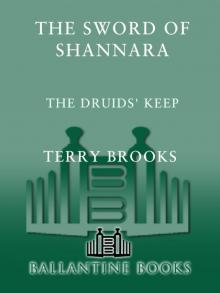 The Sword of Shannara: The Druids' Keep: The Druids' Keep
The Sword of Shannara: The Druids' Keep: The Druids' Keep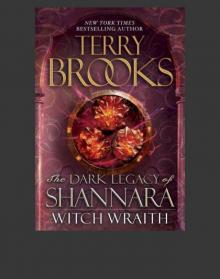 Witch Wraith
Witch Wraith The Elf Queen of Shannara
The Elf Queen of Shannara The Weapons Master's Choice
The Weapons Master's Choice The Scions of Shannara
The Scions of Shannara Armageddon's Children
Armageddon's Children The Sword of Shannara Trilogy the Sword of Shannara Trilogy
The Sword of Shannara Trilogy the Sword of Shannara Trilogy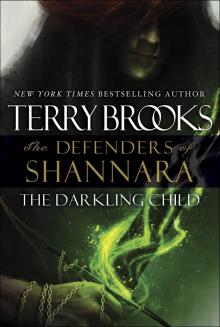 The Darkling Child
The Darkling Child The Black Unicorn
The Black Unicorn The High Druid's Blade
The High Druid's Blade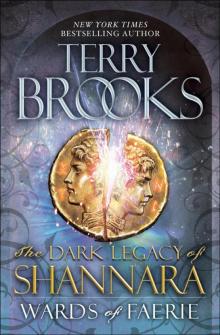 Wards of Faerie
Wards of Faerie The Tangle Box
The Tangle Box The Black Elfstone
The Black Elfstone The Black Irix
The Black Irix The Elfstones of Shannara
The Elfstones of Shannara The Magic Kingdom of Landover Volume 2
The Magic Kingdom of Landover Volume 2 Bearers of the Black Staff
Bearers of the Black Staff Jarka Ruus
Jarka Ruus The Druid of Shannara
The Druid of Shannara The Sword of Shannara
The Sword of Shannara The High Druid of Shannara Trilogy
The High Druid of Shannara Trilogy Angel Fire East
Angel Fire East The Gypsy Morph
The Gypsy Morph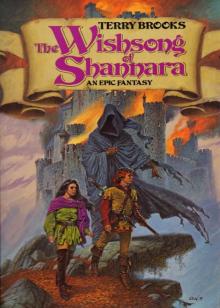 The Wishsong of Shannara
The Wishsong of Shannara Magic Kingdom for Sale--Sold
Magic Kingdom for Sale--Sold Running With the Demon
Running With the Demon Wizard at Large
Wizard at Large The Sorcerer's Daughter
The Sorcerer's Daughter Imaginary Friends
Imaginary Friends The Elves of Cintra
The Elves of Cintra Tanequil
Tanequil Witches' Brew
Witches' Brew The Sword of the Shannara and the Elfstones of Shannara
The Sword of the Shannara and the Elfstones of Shannara The World of Shannara
The World of Shannara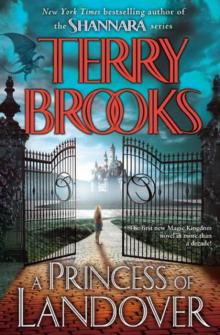 A Princess of Landover
A Princess of Landover A Knight of the Word
A Knight of the Word Straken
Straken The Skaar Invasion
The Skaar Invasion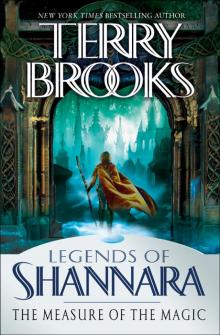 The Measure of the Magic: Legends of Shannara
The Measure of the Magic: Legends of Shannara Ilse Witch
Ilse Witch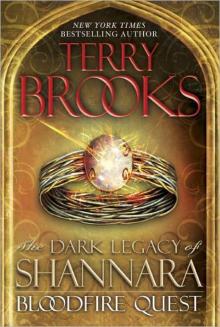 Bloodfire Quest
Bloodfire Quest The Stiehl Assassin
The Stiehl Assassin Antrax
Antrax The Last Druid
The Last Druid Paladins of Shannara: Allanon's Quest
Paladins of Shannara: Allanon's Quest Sometimes the Magic Works: Lessons From a Writing Life
Sometimes the Magic Works: Lessons From a Writing Life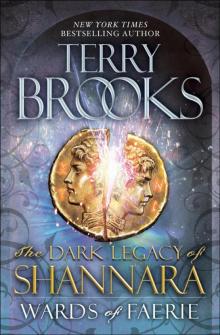 Wards of Faerie: The Dark Legacy of Shannara
Wards of Faerie: The Dark Legacy of Shannara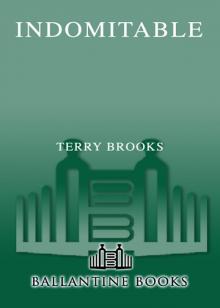 Indomitable: The Epilogue to The Wishsong of Shannara
Indomitable: The Epilogue to The Wishsong of Shannara Heritage of Shannara 01 - The Druid of Shannara
Heritage of Shannara 01 - The Druid of Shannara Star Wars - Phantom Menace
Star Wars - Phantom Menace The Dark Legacy of Shannara Trilogy 3-Book Bundle
The Dark Legacy of Shannara Trilogy 3-Book Bundle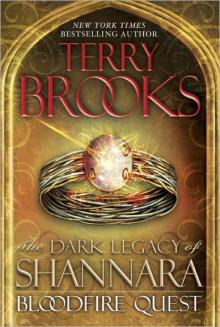 The Bloodfire Quest
The Bloodfire Quest The Hook (1991)
The Hook (1991) Star Wars: Episode I: The Phantom Menace
Star Wars: Episode I: The Phantom Menace Street Freaks
Street Freaks The Sword of Shannara & Elfstones of Shannara
The Sword of Shannara & Elfstones of Shannara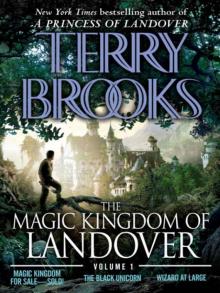 The Magic Kingdom of Landover , Volume 1
The Magic Kingdom of Landover , Volume 1 The Phantom Menace
The Phantom Menace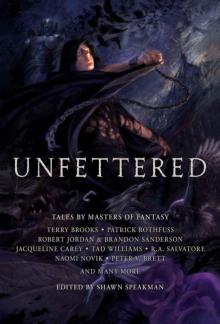 Unfettered
Unfettered Allanon's Quest
Allanon's Quest Paladins of Shannara: The Weapons Master's Choice
Paladins of Shannara: The Weapons Master's Choice Terry Brooks - Paladins of Shannara - Allanon's Quest (Short Story)
Terry Brooks - Paladins of Shannara - Allanon's Quest (Short Story) Star Wars Episode I: The Phantom Menace (star wars)
Star Wars Episode I: The Phantom Menace (star wars) Warrior (The Word and the Void)
Warrior (The Word and the Void) Word & Void 03 - Angel Fire East
Word & Void 03 - Angel Fire East![[Magic Kingdom of Landover 05] - Witches' Brew Read online](http://i1.bookreadfree.com/i2/04/05/magic_kingdom_of_landover_05_-_witches_brew_preview.jpg) [Magic Kingdom of Landover 05] - Witches' Brew
[Magic Kingdom of Landover 05] - Witches' Brew The Magic Kingdom of Landover - Volume 2
The Magic Kingdom of Landover - Volume 2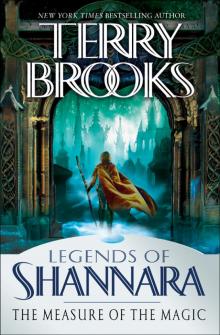 The Measure of the Magic
The Measure of the Magic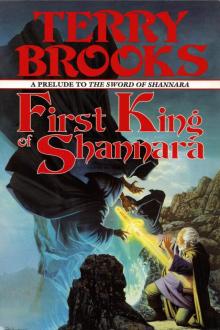 The First King of Shannara
The First King of Shannara Sometimes the Magic Works
Sometimes the Magic Works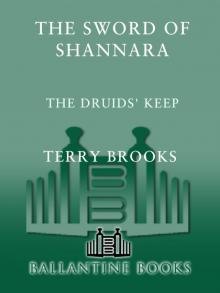 The Sword of Shannara, Part 2: The Druids' Keep
The Sword of Shannara, Part 2: The Druids' Keep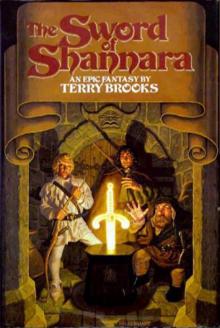 The Sword of Shannara tost-1
The Sword of Shannara tost-1 Paladins of Shannara: The Black Irix (Short Story)
Paladins of Shannara: The Black Irix (Short Story) Tangle Box
Tangle Box Word & Void 02 - A Knight of the Word
Word & Void 02 - A Knight of the Word The Sword of Shannara, Part 1: In the Shadow of the Warlock Lord
The Sword of Shannara, Part 1: In the Shadow of the Warlock Lord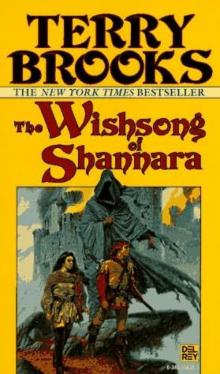 The Wishsong of Shannara tost-3
The Wishsong of Shannara tost-3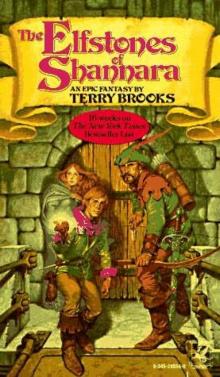 The Elfstones of Shannara tost-2
The Elfstones of Shannara tost-2